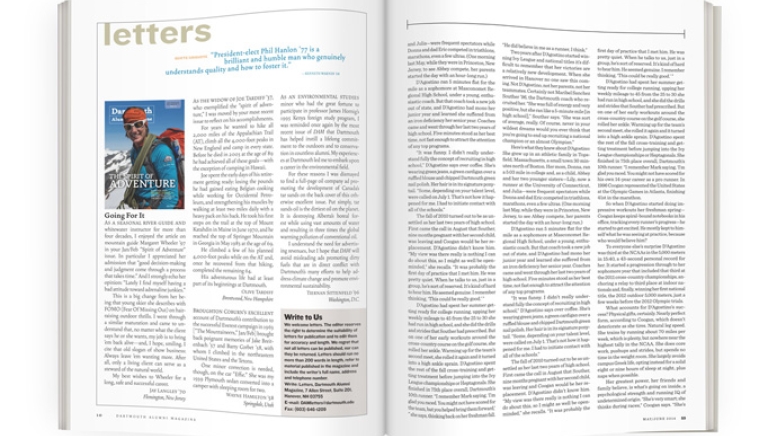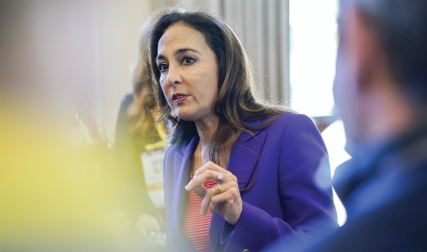Going For It As a seasonal river guide and whitewater instructor for more than four decades, I enjoyed the article on mountain guide Margaret Wheeler ’97 in your Jan/Feb “Spirit of Adventure” issue. In particular I appreciated her admission that “good decision-making and judgment come through a process that takes time.” And I strongly echo her opinion: “Lately I find myself having a bad attitude toward adrenaline junkies.” This is a big change from her being that young skier she describes with FOMO (Fear Of Missing Out) on hair-raising outdoor thrills. I went through a similar maturation and came to understand that, no matter what the client says he or she wants, my job is to bring ’em back alive—and, I hope, smiling. I cite that old slogan of show business: Always leave ’em wanting more. After all, only a living client can serve as a steward of the natural world. My best wishes to Wheeler for a long, safe and successful career.
Jay Langley ’70 Flemington, New Jersey
As the widow of Joe Tardiff ’37, who exemplified the “spirit of adventure,” I was moved by your most recent issue to reflect on his accomplishments. For years he wanted to hike all 2,000 miles of the Appalachian Trail (AT), climb all the 4,000-foot peaks in New England and camp in every state. Before he died in 2003 at the age of 89 he had achieved all of these goals—with the exception of camping in Hawaii. Joe spent the early days of his retirement getting ready: losing the pounds he had gained eating Belgian cooking while working for Occidental Petroleum, and strengthening his muscles by walking at least two miles daily with a heavy pack on his back. He took his first steps on the trail at the top of Mount Katahdin in Maine in June 1970, and he reached the top of Springer Mountain in Georgia in May 1983 at the age of 69. He climbed a few of his planned 4,000-foot peaks while on the AT and, once he recovered from that hiking, completed the remaining 64. His adventurous life had at least part of its beginnings at Dartmouth.
Olive Tardiff Brentwood, New Hampshire
Broughton Coburn’s excellent account of Dartmouth’s contribution to the successful Everest campaign in 1963 [“The Mountaineers,” Jan/Feb] brought back poignant memories of Jake Breitenbach ’57 and Barry Corbet ’58, with whom I climbed in the northeastern United States and the Tetons. One minor correction is needed, though, on the car “Effie.” She was my 1939 Plymouth sedan converted into a camper with sleeping room for two.
Wayne Hamilton ’58 Springdale, Utah
As an environmental studies minor who had the great fortune to participate in professor James Hornig’s 1995 Kenya foreign study program, I was reminded once again by the most recent issue of DAM that Dartmouth has helped instill a lifelong commitment to the outdoors and to conservation in countless alumni. My experiences at Dartmouth led me to embark upon a career in the environmental field. For these reasons I was dismayed to find a full-page oil company ad promoting the development of Canada’s tar sands on the back cover of this otherwise excellent issue. Put simply, tar sands oil is the dirtiest oil on the planet. It is destroying Alberta’s boreal forest while using vast amounts of water and resulting in three times the global warming pollution of conventional oil. I understand the need for advertising revenues, but I hope that DAM will avoid misleading ads promoting dirty fuels that are in direct conflict with Dartmouth’s many efforts to help address climate change and promote environmental sustainability.
Tiernan Sittenfeld ’96 Washington, D.C.
Presidential Seal The selection of Phil Hanlon ’77 to be the next president of Dartmouth is a superb one [“Interview,” Jan/Feb]. As former dean of the school of public health at the University of Michigan (UM), I worked closely with Phil in his capacity as vice provost and subsequently provost of the university. Hanlon is a brilliant and humble man who genuinely understands quality and how to foster it. He cares about enhancing diversity to strengthen an institution. A straight-shooter, he works effectively with administrators, faculty and students, never hesitating to criticize when appropriate but always doing so in a supportive, constructive manner. Importantly, he led substantial cost-cutting and reallocation efficiency-enhancing measures at UM that placed the university in terrific financial shape at a time when much of academia, and indeed the entire state of Michigan, was in dire financial circumstances. I couldn’t be more pleased for my alma mater.
Kenneth Warner ’68 Traverse City, Michigan
Crime and Punishment I’m glad my classmate Michael Gazzaniga ’61 is lending his impressive knowledge of neuroscience to the improvement of our criminal justice system [“Is Your Brain to Blame?” Nov/Dec 2012]. The law can use all the help it can get. I look forward to reading what he has to say in his latest book, Who’s In Charge? Free Will and the Science of the Brain. However, Mike makes a statement in your story that sharply contradicts what I’ve experienced as a lawyer and what I’ve learned about human nature generally: “The simple question, which you can answer 99 percent of the time, is, ‘Did this guy do the crime?’ ” In fact, our criminal justice system doesn’t even identify a viable suspect with regard to many crimes, and we most likely convict innocent defendants a good deal more often than 1 percent of the time. Why? We humans just don’t get it right (whatever the “it” may be) significantly more frequently than 1 percent of the time, and—although there are exceptions—for those who manage our criminal justice system, finding the truth just isn’t as high a priority as they want us to believe.
Marvin Witofsky ’61 Pittsburgh, Pennsylvania
Combat Commentary Thanks for the reports on alumni who volunteered for Afghanistan and Iraq. As our ex-President (and former Marine) Jim Wright emphasizes [“Battle Scarred,” Sept/Oct 2012], most Americans have never served in combat. Indeed, fewer younger Americans than in previous generations have served the nation in any way. I have found near-consensus among those who have served that in our divided society we need some system of national service to bring young Americans together for at least a year or two and do some concrete good. Although I served in the Army, I do not think this system should be a military draft. It could instead require all young people to spend two years or less, between high school and college, serving the country. A lottery would send an individual to work, say, in a national forest or national park, hospice or hospital, inner-city school—or the military if an individual volunteered for that. Result: patriotism, a more united society and good works from clearing forest trails to caring for young and old. One economist friend says this would be a regressive tax on the young. I think it would be a good investment for country and for people.
Peter Bridges ’53 Arlington, Virginia
The intelligent veterans who told their interesting stories in DAM [“War Stories,” Sept/Oct 2012] were remarkable. As soldiers their duty is only to follow orders, but they need to respect those of us opposed to war. It took a lot of courage from a lot of intelligent civilians to bring the Vietnam War to an end. Why did John Lennon die when he sang so eloquently for peace? Why did Martin Luther King die when he spoke out against the Vietnam War? Why did R.F.K. die when he was about to become a peace candidate for president? Why was J.F.K. taken out of the way just before he would have removed us from Vietnam? What do we need to do to create societies at peace, respectful of differences? I have just read Extreme Prejudice by former CIA asset Susan Lindauer. These veterans should read it too. Perhaps they could suggest what we should do about the Patriot Act laws and now the Indefinite Detention Act that override our former constitutional rights. Now that the delusional Pax Americana Great American Empire mania has blown up in our faces, and the country is broken financially with debts and unfunded obligations of $87 trillion, maybe they can help us think our way out of this. What sort of country have we come out with after all? What may happen when the interest rates inevitably rise?
Jay S. Wakefield ’65 Kirkland, Washington
I read with interest the stories, articles and analyses regarding recent Dartmouth veterans. I love these young men and women, their courage, sense of duty and willingness to answer the call of their country. Such is the zeitgeist on the campuses of privilege in recent years that these soldiers are actually unusual, and that gives me hope. That said, I worry about the self-congratulatory aspect of the “War Stories” special issue. As a veteran myself, I am perhaps sensitive to this. But the veterans featured represent about a 10th of a percent of the subject population. Regardless of how the numbers are framed, this is a tiny number. While they may make many of us feel righteous by association, that worries me.
John R. Frondorf ’69 Philadelphia




